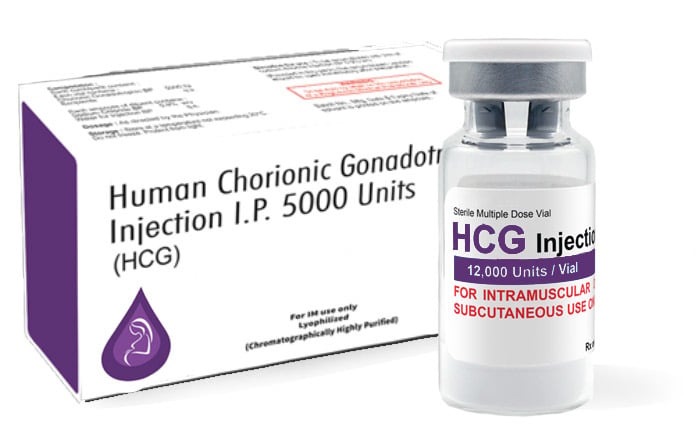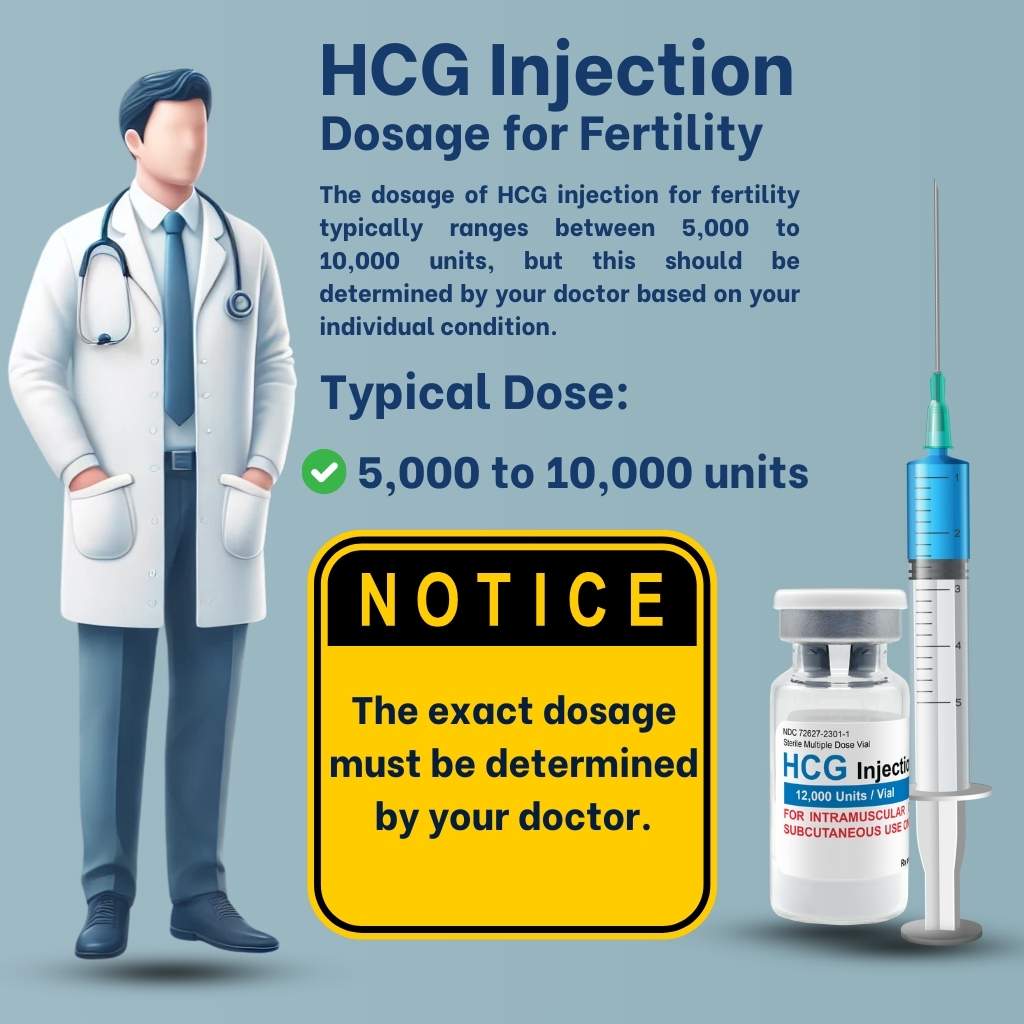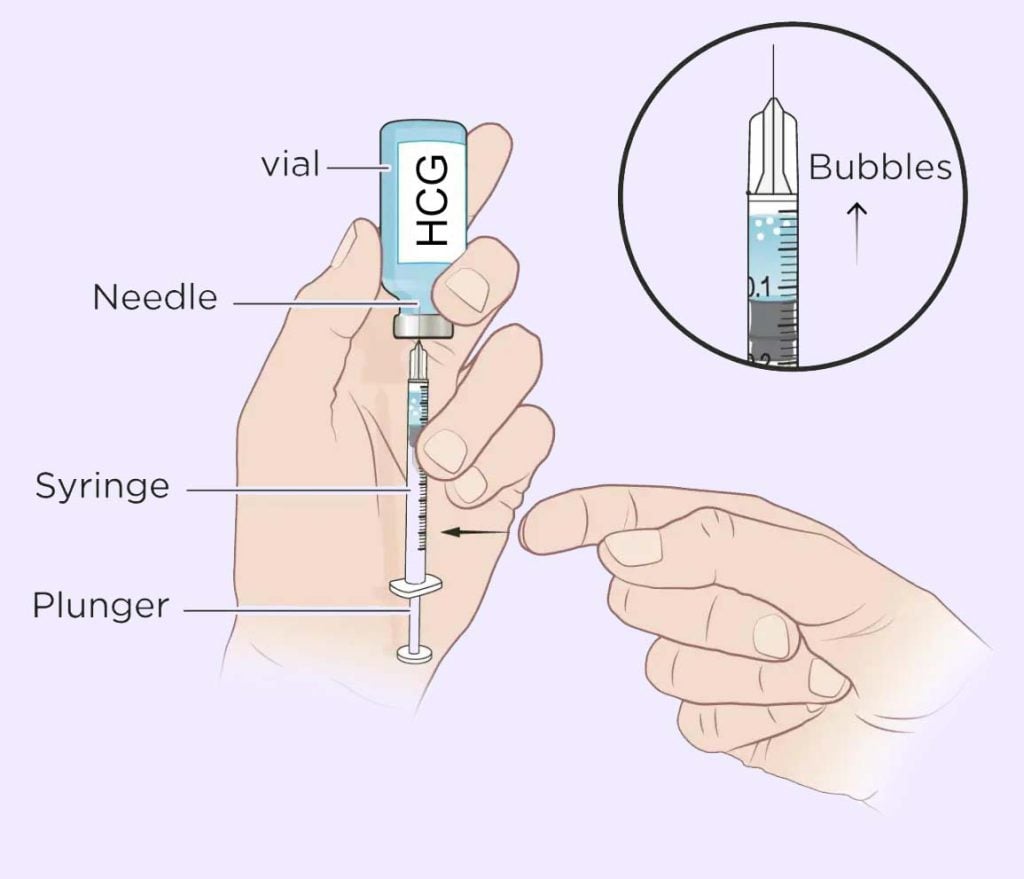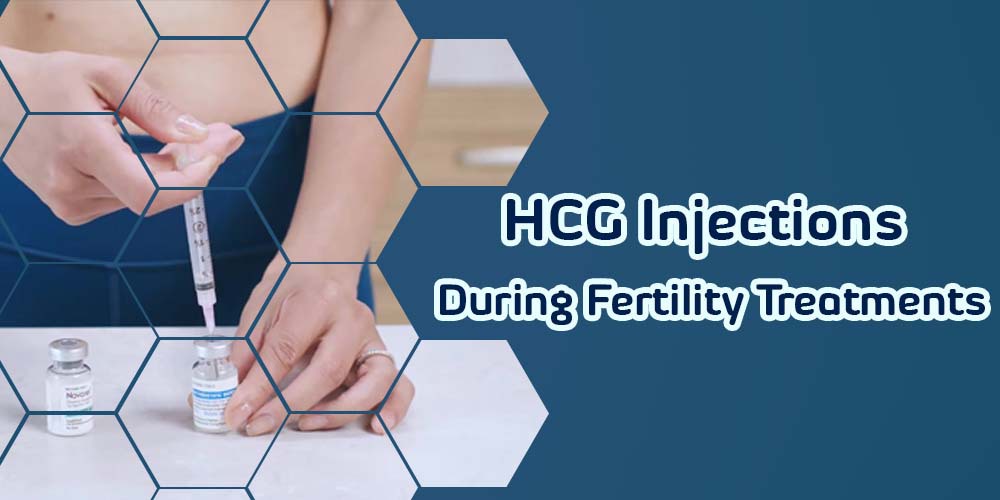HCG stands for Human Chorionic Gonadotropin. It is an important hormone that is produced in pregnant women until on average the 11th week of pregnancy. HCG triggers the production of estrogen and progesterone, so raises the chance of pregnancy.
Luteinizing hormone (LH) is an important hormone that has several essential roles and can be used for treating men’s and women’s infertility.
The problem is that LH is hard to be separated and purified as a compound, on the other hand, HCG acts like LH and is easier to be prepared as a compound. That is why HCG injections are used in infertility treatments.
Do you want to know about HCG hormone injections for fertility, HCG 5000 injection for ovulation, HCG injections for low sperm count, HCG injections for IUI, and HCG injections for fertility cost in TebMedTourism? This article explains how HCG injections are used in fertility treatments. It also covers all you need to know about HCG injections during infertility treatment.

What is HCG and how is it produced?
HCG is a hormone that can be produced naturally in a female body, and a little amount of it may be found in the body at any time, but generally, it is secreted in pregnant women by the cells enclosing the growing embryo, named trophoblasts, and then by the placenta. Trophoblast cells will form the placenta.
What does HCG do in pregnant women?
- Pregnancy detection
- Stimulating the corpus luteum
- Fetal development by triggering the production of estrogen and progesterone
After ovulation, each follicle that is ruptured and released an egg in the ovary forms a structure called the corpus luteum, which produces progesterone. HCG stimulates the corpus luteum to continue producing progesterone during the early stages of pregnancy. Without progesterone, the womb lining would shed and prevent embryo formation or implantation. HCG doesn’t let it happen by the mentioned progesterone production procedure until the placenta is formed, and commands progesterone production.
HCG also triggers the female body to produce more estrogen. HCG hormone along with estrogen and progesterone helps the pregnant woman's uterine lining thicken to support the growing embryo, and tell her body to stop menstruation. HCG levels keep rising in pregnant women till about 10-12 weeks.
Why is HCG used in Infertility treatment?
Luteinizing hormone (LH) is an important hormone in both women and men bodied that has several essential roles. LH stimulates the maturation of ovarian follicles and triggers eggs release from the ovary.
Unfortunately, LH is difficult to be separated and purified as a compound.
On the other hand, HCG has the same effect on the ovary as LH has but is much easier to be prepared, So HCG can be used to produce the final maturation and release eggs at the ovulation time during fertility treatments.
HCG injection also can be used for male infertility treatment because it can stimulate the testicles to produce sperm and testosterone.
HCG Injections During Fertility Treatment
Based on the selected treatment method by doctors, HCG Injections can be used alone or sometimes during fertility treatments specially in In Vitro Fertilization (IVF) or Intrauterine Insemination (IUI) methods.
The HCG injections can be given either under the skin subcutaneously or into the buttocks intramuscularly. It depends on your doctor’s choice.
The Food and Drug Administration (FDA) has approved uses for HCG as a fertility treatment for both men and women.
IVF Trigger Injection
The IVF trigger injection, trigger shot fertility, or trigger shot in IVF, is a hormonal injection that is used in different fertility treatments including IVF. This trigger injection usually contains an HCG. This hormone triggers an ovary to mature and release an egg.
Trigger Shot IVF Timing
In most cases, the IVF trigger injection needs to be taken 36 hours before egg collection (a day and a half prior).

HCG Injections for Female Infertility Treatment
- Women with certain ovulation disorders
- Women with irregular menstrual cycles
- Women undergoing fertility treatments such as IVF or IUI procedures
HCG Injections for Male Infertility Treatment
- Treating Adolescent boys with cryptorchidism
Adolescent boys with cryptorchidism, a condition in which one or both of the testes fail to descend from the abdomen into the scrotum.
- Treating male infertility
- Men with hypogonadism, a situation in which their testes can’t produce enough testosterone.
HCG acts like LH and stimulates Leydig cells in the testicles. It results in the production of testosterone.
- HCG injections for low sperm count
HCG also stimulates sperm production within structures in the testicles called seminiferous tubules
- Testicular shrinkage
As HCG stimulates the testicles to produce sperm and testosterone, the testicles grow in size over time.
HCG Injection Dosage for Fertility
The specific HCG dosages and treatment methods must be decided by a qualified doctor based on factors such as the person's age, medical history, hormone levels, and responses to previous treatments.

HCG Injection Dosage for Female Fertility
For Ovulation Induction in Women:
The dosage may range from 5,000 to 10,000 international units (IU) with a proper injection schedule.
HCG Injection Dosage for Male Fertility
For Testosterone Stimulation in Men:
The dosage of HCG in men can vary and is often prescribed as a series of injections that are given over a particular period. The dosage may range from 1,000 to 4,000 IU (two to three times per week) for several weeks or months.
Since many forms and brands of HCG are available, we recommend you ask your healthcare provider to prescribe the most appropriate one for you.
Who should not use HCG injection?
- In general, people with the following conditions should not take HCG injections:
- Asthma
- Hypersensitivity or sensitivity to HCG and its components
- Hormone-dependent cancer, which depends on a hormone for growth and/or survival, such as breast, ovarian, and prostate cancer.
Premature puberty
- Pregnancy or suspicion of pregnancy
- Breast feeding
- Blood clotting disorders (HCG can potentially increase the risk of blood clots, which can be dangerous in these patients).
- Cyst on the ovary
- Heart disease
- Migraine
- Kidney disease
- Convulsions
- Epilepsy
- Uterine or vaginal bleeding of unknown cause
HCG Injections Side effects
HCG injection, like most medicines, can have mild to severe side effects, some of them are listed below. HCG injection symptoms are usually not dramatic, and many individuals have no symptoms at all.
You need to inform your doctor about the following side effects as soon as possible:
- Allergic reactions like skin rash, itching, hives, face, lips, or tongue swell (it can be avoided by a skin test before the injection)
- Fluid Retention and swelling in various parts of the body
- Breathing problems
- Breast enlargement
- Enlargement of penis and testes
- Ovarian hyperstimulation syndrome (OHSS), in which the ovaries become swollen and painful. Symptoms include abdominal pain, bloating, nausea, vomiting, etc.
- Pelvic pain or bloating
- Troubled urinating
- Nausea and/or vomiting
- Depression
You don’t need to inform your doctor about the following side effects unless they continue to be bothersome.
- Swelling, discomfort, or irritation at the site where HCG was injected
- Mood swings
- Facial hair growth
- Headache
- Tiredness
- Fatigue
- Upset stomach
- Slight weight fluctuations
When to Take HCG?
As mentioned before, this medication is taken once there is a mature egg follicle in the ovary. Your doctor will give you a specific time frame for the HCG injections. If you forgot to take the medication on time, tell your doctor to let him or her consider the necessary adjustments.
- In the case of having intercourse or IUI, since ovulation will occur on average 36 hours after HCG injection, so the day of the injection and two days after that, are your critical days.
- In the case of having eggs punctured for IVF, it needs to be done close to the 36th hour. It will optimize the maturation but avoid rupture.

How to inject HCG ampoule?
HCG injection is given in different ways based on whether the ampoule contains liquid or powder.
liquid HCG ampoule
HCG liquid ampoules should be refrigerated instantly (up to three hours after receiving it from the pharmacy). It only can be removed from the refrigerator at the injection time.
Note: Never use HCG liquid ampoule that hasn’t been refrigerated.
The ampoule is only allowed to be warmed in the hand before use because injection of a cold liquid can make the patient feel uncomfortable.
the injection is done after the HCG liquid is drawn into a syringe and the trapped air is removed.
Powder HCG ampoule that is ready to be mixed
On the other hand, the powder ampoule can be kept at room temperature before usage. During the injection 1 ml (1 cc) of bacteriostatic water is pulled from the vial into a syringe and then squirted into the vial containing the powder. then they will be gently mixed by rolling the vial around slowly.
Note: Don’t shake the vial because it might make the medication ineffective or less effective.
Finally, the injection can be done after the mixed fluid is drawn back into the syringe and the trapped air is released.
Symptoms of ovulation after HCG injection
- Nausea
- Cramping
- Increased body temperature
- Mood changes
- Smell sensitivity
- Increase in libido
- Abdominal and/or pelvic pain
- Changes in cervical mucus
- Bloating
- Breast tenderness or soreness
False positive pregnancy test after HCG injection and how to avoid it?
Typically, after HCG injection, it takes at least 10 days for the hormones to be eliminated from blood and urine, So, if you do a pregnancy test in less than 10 days, you may get a false-positive because the origin of the detected HCG is the injection, not what a pregnancy is making.
The best time for a blood or urine pregnancy test is 12-14 days after HCG injection.
What may interact with HCG?
There may be drugs that interact with HCG. Make sure you tell your doctor about all the prescription and over-the-counter medications you use. It also includes herbal products.
HCG supplements
Nutritional supplements of HCG may be available in the market with many claims, but HCG is only approved as a prescription drug in injectable form, for treating infertility.
HCG injection in case of struggling with miscarriages
Choosing HCG injection during infertility treatment, in cases of recurrent miscarriages is a complex decision that needs to be made in consultation with a reproductive specialist. HCG may be contemplated as a part of a person's treatment method, but the first and most important step is to find out the primary cause of the recurrent miscarriages such as chromosomal or uterine abnormalities, hormonal imbalances, autoimmune disorders, or blood clotting diseases.
HCG Injection and Twins
HCG injection in women can increase their chances of conceiving twins because of the Stimulation of multiple follicles, and enhanced ovulation which are done in this method; however, it needs to be considered that with the increased number of embryos, the risks of pregnancy increase, so the patient must be fully observed during infertility treatment as well as her pregnancy by a specialist doctor.
Reasons for Pregnancy failure after HCG Injection
There are various reasons for not getting pregnant after an HCG injection, including:
- Women with high androgen levels
- Women with poor ovarian response
- Women with undefined fertility issues
- Men with poor semen quality or/and quantity
- Wrong timing of intercourse or IUI
- Not getting enough HCG doses
HCG injections for weight loss and fertility
In the context of fertility treatments, there is no trustworthy evidence that HCG injections will lead to significant weight loss. However, some patients may have slight weight fluctuations due to various reasons such as fluid retention, other hormones and medications that may be used in combination with HCG, stress, etc.
How Often Do HCG Level Tests Need to Be Performed During Pregnancy?
Reasons for performing HCG level tests vary based on several factors, such as the stage of pregnancy, the presence of any concerns, and the doctor's decision.
- Confirming pregnancy
blood or urine pregnancy test can be performed, 12-14 days after HCG injection.
- Early pregnancy monitoring
Since HCG levels are expected to rise during early pregnancy, if there are any concerns about the development of the pregnancy, especially when there was a history of miscarriage or symptoms such as bleeding or abdominal pain, a series of HCG level tests will be done a few days to monitor the rate of the increase.
- Assessing pregnancy viability
HCG levels also may be tested in cases where there is a chance of an ectopic pregnancy and/or a potential miscarriage. In these situations, serial HCG tests are performed to monitor the trend of HCG levels. a significant decline in HCG levels probably indicates a non-viable pregnancy.
- stational trophoblastic disease (GTD)
GTD stands for Gestational trophoblastic diseases which is a group of rare diseases in which abnormal trophoblast cells grow inside the uterus after conception. In these cases, a series of HCG-level tests must be done to monitor the success of treatment.
Frequently Asked Questions:
- How long after HCG injection does ovulation start?
Ovulation will start on average 36 hours after HCG injection.
- How will a patient feel after HCG injections?
Individuals may experience mild to severe side effects after HCG injections. Please refer to the “HCG Injections Side Effects” section for the complete information.
- Can HCG injection cause ovarian cysts?
It might cause ovarian cysts because, in infertility treatments for women, HCG injections are used to stimulate the ovaries.
- How much do HCG injections cost during IVF in TebMedTourism?
Our IVF package costs $3,200 $. HCG injections during infertility treatment have no extra charge for our patients.
- When can I test my pregnancy after the HCG injection?
The best time for a blood or urine pregnancy test is 12-14 days after HCG injection.
- When do the eggs rupture after HCG injection?
It almost happens after 36-46 hours.
- Can HCG injections improve the chance of having twins?
Yes. HCG injection in women can increase their chances of having twins.
- Can HCG help men for treating their infertility problems?
Yes. HCG is an important hormone that can be used for treating male and female infertility.
- Where should I keep my HCG vials?
HCG liquid vials should be refrigerated instantly until three hours after getting it from the pharmacy. The powder ampoule can be kept at room temperature before use.
- Why does a false positive pregnancy test happen after HCG injection?
In the case of HCG injections, a false-positive just may happen if the pregnancy test is done before 12-14 days because after the injection, it takes at least 10 days for the hormones to be eliminated from blood and urine.
- Why HCG injections are used in IUI?
HCG injections are used in IUI to trigger ovulation and to optimize the timing of insemination.
- How much HCG injection for fertility is needed?
The dosage is different for women and men. For women, it may range from 5,000 to 10,000 IU with a proper injection schedule, and for men, the dosage may range from 1,000 to 4,000 IU (two to three times per week) for several weeks or months.
- How to take HCG injections for fertility?
The HCG injections for fertility can be given either under the skin subcutaneously or into the buttocks intramuscularly depending on the doctor’s choice.
- What are HCG injections for male infertility side effects?
All the side effects for both genders are listed in the " HCG Injections Side Effects" section. There is also concern about the potential stimulation of pre-existing testicular tumors with HCG treatment. Proper evaluation before starting HCG injections is essential for these persons.
- Do HCG injections increase sperm count?
Yes. HCG injections can trigger sperm production and increase sperm count in men.
- How much is the cost of HCG injections for fertility in Nigeria?
The cost of HCG injections varies widely depending on factors, including the brand of HCG, clinic, dosage, etc.





Comments & Questions